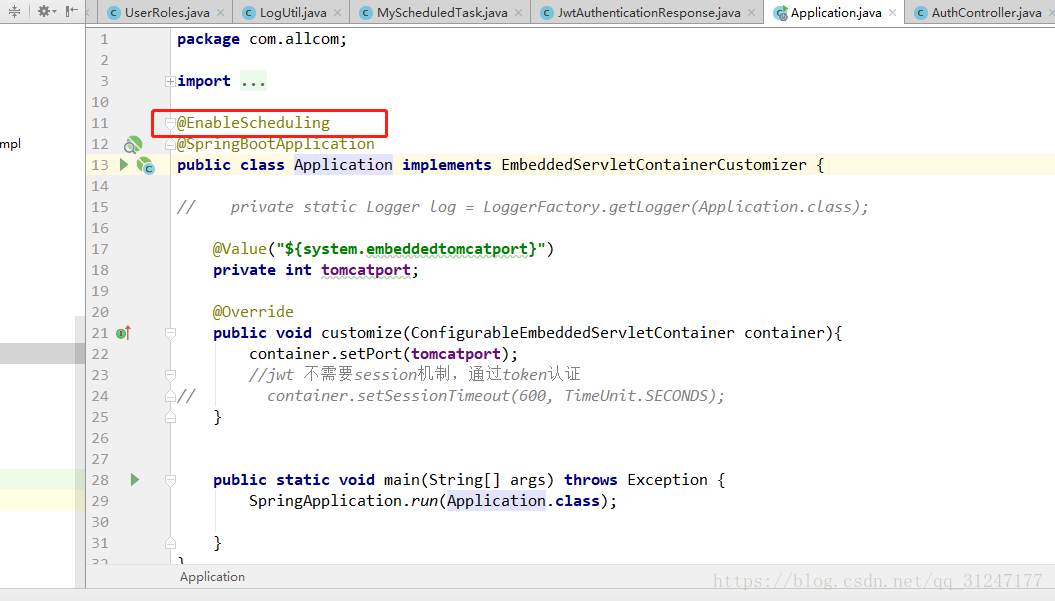SpringBoot实现动态定时任务
项目情况:
在当前项目中需要一个定时任务来清除过期的校验码,如果使用数据库存储过程的话不方便维护。因此采用SpringBoot自带的方式来设置定时任务。
技术说明:
SpringBoot自带的方式有两种可以实现:
一种是使用@Scheduled注解的方式,只需要在启动类或者它所在的类上添加@EnableScheduling注解允许执行定时任务,并且设置Schecduled注解的参数,诸如:
1.cron是设置定时执行的表达式,如 0 0/5 * * * ?每隔五分钟执行一次
2.zone表示执行时间的时区
3.fixedDelay 和fixedDelayString 表示一个固定延迟时间执行,上个任务完成后,延迟多长时间执行
4.fixedRate 和fixedRateString表示一个固定频率执行,上个任务开始后,多长时间后开始执行
5.initialDelay 和initialDelayString表示一个初始延迟时间,第一次被调用前延迟的时间
示例代码如下:
package com.allcom.service;
import com.allcom.dao.MysqlDao;
import org.springframework.beans.factory.annotation.Autowired;
import org.springframework.scheduling.annotation.Scheduled;
import org.springframework.stereotype.Service;
/**
* @Author: zy
* @Description: 定时任务
* @Date: 2018/7/12_15:15
**/
@Service
public class TaskService {
@Autowired
private MysqlDao mysqlDao;
@Scheduled(fixedRate = 5*1000)
public void deleteInvalidCheckCode() {
mysqlDao.deleteInvalidCheckCode();
}
}
另一种方式是通过自定义配置类的方式,步骤如下:
第一步:新建一个类实现SchedulingConfigurer接口,并添加@Configuration注解,@EnableScheduling注解可以写在这里也可以写在启动类上,这里我写在了启动类上。

第二步: 重写configureTasks方法如下代码所示:
package com.allcom.task;
import com.allcom.service.TaskService;
import org.apache.ibatis.annotations.Mapper;
import org.apache.ibatis.annotations.Select;
import org.springframework.beans.factory.annotation.Autowired;
import org.springframework.context.annotation.Configuration;
import org.springframework.scheduling.Trigger;
import org.springframework.scheduling.TriggerContext;
import org.springframework.scheduling.annotation.SchedulingConfigurer;
import org.springframework.scheduling.config.ScheduledTaskRegistrar;
import org.springframework.scheduling.support.CronTrigger;
import java.util.Date;
@Configuration
public class MyScheduledTask implements SchedulingConfigurer {
@Mapper
public interface CronMapper {
@Select("select cron from user_cron limit 1")
String getCron();
}
@Autowired
@SuppressWarnings("all")
CronMapper cronMapper;
@Autowired
@SuppressWarnings("all")
private TaskService taskService;
@Override
public void configureTasks(ScheduledTaskRegistrar scheduledTaskRegistrar) {
scheduledTaskRegistrar.addTriggerTask(new Runnable() {
@Override
public void run() {
try {
taskService.deleteInvalidCheckCode(); //异步定时操作
} catch (Exception e) {
e.printStackTrace();
}
}
}, new Trigger() {
@Override
public Date nextExecutionTime(TriggerContext triggerContext) {
String cron =cronMapper.getCron();
if("".equals(cron)||cron==null)
return null;
//定时任务触发,可修改定时任务的执行周期
CronTrigger trigger=new CronTrigger(cron);
Date nextExecDate= trigger.nextExecutionTime(triggerContext);
return nextExecDate;
}
});
}
}
第三步:启动项目,定时任务就自动添加了。
注意:这里我使用的是@Mapper注解使用Mybatis写了一个获取cron表达式的接口,可以从数据库中查询自定义表的cron字段值。这样的话项目运行的过程中,不用重新启动项目,只需要修改数据库中的字段值就可以动态的修改定时任务中的cron值,实现动态修改定时任务执行时间的功能。
但是,这种方式有一个缺点就是,将数据库cron字段值设为null或者“”以及不正确的值,这样定时任务就会停止执行,这样就算你下一次再给cron字段添加了正确的值,项目也不会执行定时任务了,这个时候就需要重新启动数据库才行。
这种方式适合于前台给几个特定的值给用户选择,不能让用户随便填。
附定时任务执行内容:
/**
* @Author: zy
* @Description: 删除用户过期的校验码
* @Date: 2018/7/12_15:20
**/
@Delete("DELETE from registinfo where id in (select id from (SELECT id FROM registinfo WHERE TIMESTAMPDIFF(MINUTE,lastupdatetime,NOW()) >= 15)a )")
void deleteInvalidCheckCode();
以上就是本文的全部内容,希望对大家的学习有所帮助,也希望大家多多支持我们。

